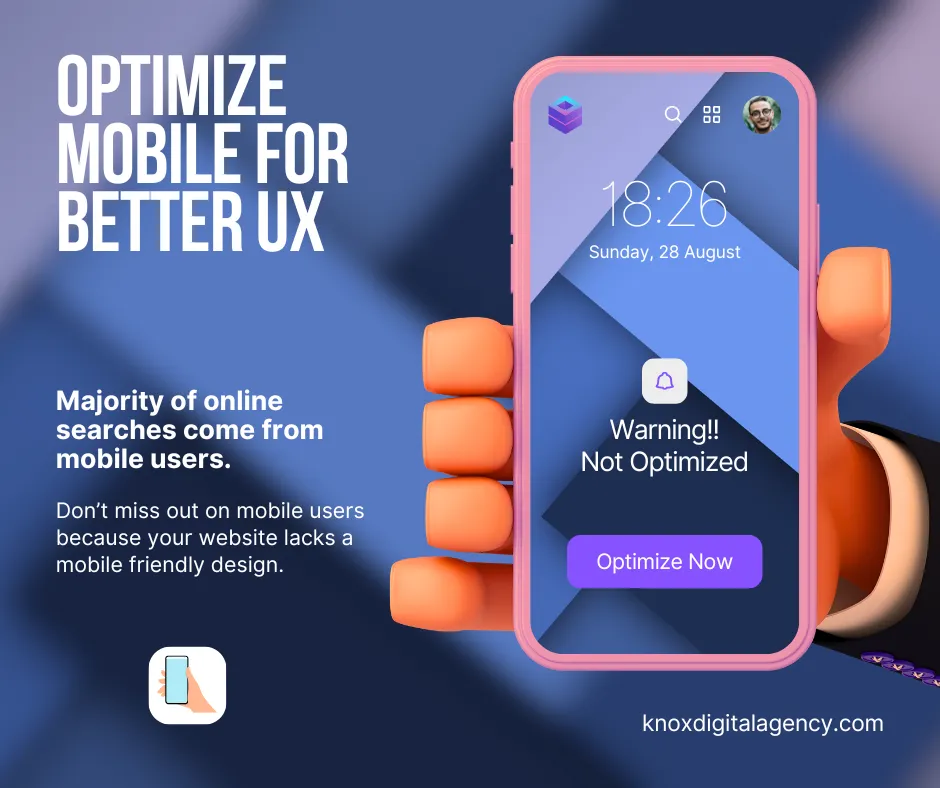
Mobile website optimization
The Mobile Advantage: Why Optimizing Your Website for Mobile is Crucial
In a world where technology is constantly evolving and our devices are becoming more portable and powerful, the way we access information and interact with websites has fundamentally changed. Mobile devices, particularly smartphones, have taken center stage in our lives, becoming our go-to tools for communication, entertainment, and information consumption. This shift in online behavior has significant implications for businesses and website owners. Optimizing your website for mobile devices is no longer just an option; it's a crucial step that can make or break your online success.
The Rise of Mobile Browsing
The rise of mobile browsing has been nothing short of transformative. The convenience of having the internet at our fingertips has revolutionized how we shop, learn, connect, and even work. According to Statista, as of 2021, over 50% of global web traffic came from mobile devices. This number has been steadily increasing year after year, reinforcing the idea that mobile browsing is not a passing trend but a dominant mode of accessing online content.
User Experience: The Key Driver
User experience (UX) lies at the heart of every successful website. It encompasses the ease of navigation, readability of content, and overall satisfaction a user derives from interacting with your website. When it comes to mobile browsing, UX becomes even more critical. Mobile screens are smaller, touch interfaces require precision, and data connectivity can vary. A website that is not optimized for mobile can lead to frustrating user experiences—slow loading times, distorted layouts, and hard-to-click buttons.
Imagine a potential customer trying to navigate your website on their smartphone, only to struggle with zooming in and out to read text or to click on tiny links. Such an experience can quickly drive users away, potentially to your competitors who offer a smoother mobile experience. On the flip side, a mobile-optimized website ensures that your content is presented in a clear and concise manner, making it easy for users to explore your offerings without any hindrance.
SEO and Mobile Friendliness
Search engines, particularly Google, have recognized the importance of mobile-friendly websites in enhancing the user experience. Google's algorithms take into account the mobile-friendliness of a website when determining its search engine rankings. This means that if your website isn't optimized for mobile devices, you could be missing out on valuable organic traffic.
Google's emphasis on mobile-friendliness is based on the understanding that users are more likely to engage with content that is easily accessible and readable on their devices. Mobile-friendly websites tend to have lower bounce rates and longer average session durations, signaling to search engines that the content is relevant and engaging. As a result, optimizing your website for mobile isn't just about catering to users—it's also a strategic move to improve your search engine visibility.
Reaching a Wider Audience
Accessibility is a core principle of web design, and mobile optimization plays a significant role in ensuring that your website is accessible to a diverse audience. In many parts of the world, smartphones are the primary means of accessing the internet, especially in regions where desktop computers are less common. By making your website mobile-friendly, you open up the doors to a wider audience that might not have easy access to traditional computing devices.
Consider the global reach your business can achieve by catering to users who rely on their smartphones for online interactions. Whether you're a local business looking to attract nearby customers or an online retailer targeting an international market, a mobile-optimized website can help you connect with audiences that might have been otherwise inaccessible.
The Need for Speed
In today's fast-paced world, speed matters—a lot. Mobile users have shorter attention spans, and they expect websites to load quickly. A delay of just a few seconds can lead to frustration and abandonment. This is where website optimization comes into play. Optimizing your website for mobile involves various techniques such as compressing images, minifying code, and leveraging browser caching. These optimizations not only enhance the user experience but also contribute to faster loading times. Google's mobile-first indexing means that the search engine primarily uses the mobile version of the content for indexing and ranking. If your mobile version loads slowly or delivers a subpar experience, it can negatively impact your search rankings, further emphasizing the need for a fast and responsive mobile website.
Adapting to Changing User Behavior
The way users interact with websites is constantly evolving, and businesses need to adapt to these changes to stay relevant. With the proliferation of voice search and virtual assistants, the way users search for information online is shifting. People are asking questions and making queries in a conversational manner. This trend has implications for keyword targeting and content optimization. A mobile-optimized website that caters to these changing search patterns is better positioned to capture traffic from voice searches and other emerging search trends.
Embracing a Mobile-First Approach
As we've explored, optimizing your website for mobile devices goes beyond just making it fit on a smaller screen. It's about creating a seamless and enjoyable experience for users who access your website on a variety of devices and screen sizes. Embracing a mobile-first approach to web design and development involves considering mobile users as a priority and designing your website with their needs in mind.
This approach also encourages a streamlined and focused design, forcing you to prioritize the most important elements of your website. As a result, your desktop version can also benefit from the simplicity and efficiency that stem from a mobile-first design philosophy.
The mobile advantage is not just a fleeting trend; it's a fundamental shift in how people consume digital content. Optimizing your website for mobile devices is no longer optional—it's a strategic imperative that can impact your user experience, search engine visibility, and overall business success. By providing a seamless and engaging mobile experience, you not only cater to your current audience but also tap into the vast potential of a mobile-driven world. So, take the leap, embrace mobile optimization, and position your website for success in the mobile era. Your users—and your business—will thank you.
To read more about optimizing your website for mobile users, click here
Written By: Tyler Knox
Owner of Knox Digital Agency



Up Next >
Up Next >
Mobile website optimization
The Mobile Advantage: Why Optimizing Your Website for Mobile is Crucial

In a world where technology is constantly evolving and our devices are becoming more portable and powerful, the way we access information and interact with websites has fundamentally changed. Mobile devices, particularly smartphones, have taken center stage in our lives, becoming our go-to tools for communication, entertainment, and information consumption. This shift in online behavior
has significant implications for businesses and website owners. Optimizing your website for mobile devices is no longer just an option; it's a crucial step that can make or break your online success.
The Rise of Mobile Browsing
The rise of mobile browsing has been nothing short of transformative. The convenience of having the internet at our fingertips has revolutionized how we shop, learn, connect, and even work. According to
Statista, as of 2023, over 50% of global web traffic came from mobile devices. This number has been steadily increasing year after year, reinforcing the idea that mobile browsing is not a passing trend but a dominant mode of accessing online content.
User Experience: The Key Driver
User experience (UX) lies at the heart of every successful website. It encompasses the ease of navigation, readability of content, and overall satisfaction a user derives from interacting with your website. When it comes to mobile browsing, UX becomes even more critical. Mobile screens are smaller, touch interfaces require precision, and data connectivity can vary. A website that is not optimized for mobile can lead to frustrating user experiences—slow loading times, distorted layouts, and hard-to-click buttons.
Imagine a potential customer trying to navigate your website on their smartphone, only to struggle with zooming in and out to read text or to click on tiny links. Such an experience can quickly drive users away, potentially to your competitors who offer a smoother mobile experience. On the flip side, a mobile-optimized website ensures that your content is presented in a clear and concise manner, making it easy for users to explore your offerings without any hindrance.
SEO and Mobile Friendliness
Search engines, particularly Google, have recognized the importance of mobile-friendly websites in enhancing the user experience. Google's algorithms take into account the mobile-friendliness of a website when determining its search engine rankings. This means that if your website isn't optimized for mobile devices, you could be missing out on valuable organic traffic.
Google's emphasis on mobile-friendliness is based on the understanding that users are more likely to engage with content that is easily accessible and readable on their devices. Mobile-friendly websites tend to have lower bounce rates and longer average session durations, signaling to search engines that the content is relevant and engaging. As a result, optimizing your website for mobile isn't just about catering to users—it's also a strategic move to improve your search engine visibility.
Reaching a Wider Audience
Accessibility is a core principle of web design, and mobile optimization plays a significant role in ensuring that your website is accessible to a diverse audience. In many parts of the world, smartphones are the primary means of accessing the internet, especially in regions where desktop computers are less common. By making your website mobile-friendly, you open up the doors to a wider audience that might not have easy access to traditional computing devices.
Consider the global reach your business can achieve by catering to users who rely on their smartphones for online interactions. Whether you're a local business looking to attract nearby customers or an online retailer targeting an international market, a mobile-optimized website can help you connect with audiences that might have been otherwise inaccessible.
The Need for Speed
In today's fast-paced world, speed matters—a lot. Mobile users have shorter attention spans, and they expect websites to load quickly. A delay of just a few seconds can lead to frustration and abandonment. This is where website optimization comes into play. Optimizing your website for mobile involves various techniques such as compressing images, minifying code, and leveraging browser caching. These optimizations not only enhance the user experience but also contribute to faster loading times. Google's mobile-first indexing means that the search engine primarily uses the mobile version of the content for indexing and ranking. If your mobile version loads slowly or delivers a subpar experience, it can negatively impact your search rankings, further emphasizing the need for a fast and responsive mobile website.
Adapting to Changing User Behavior
The way users interact with websites is constantly evolving, and businesses need to adapt to these changes to stay relevant. With the proliferation of voice search and virtual assistants, the way users search for information online is shifting. People are asking questions and making queries in a conversational manner. This trend has implications for keyword targeting and content optimization. A mobile-optimized website that caters to these changing search patterns is better positioned to capture traffic from voice searches and other emerging search trends.
Embracing a Mobile-First Approach
As we've explored, optimizing your website for mobile devices goes beyond just making it fit on a smaller screen. It's about creating a seamless and enjoyable experience for users who access your website on a variety of devices and screen sizes. Embracing a mobile-first approach to web design and development involves considering mobile users as a priority and designing your website with their needs in mind. This approach also encourages a streamlined and focused design, forcing you to prioritize the most important elements of your website. As a result, your desktop version can also benefit from the simplicity and efficiency that stem from a mobile-first design philosophy.
The mobile advantage is not just a fleeting trend; it's a fundamental shift in how people consume digital content. Optimizing your website for mobile devices is no longer optional—it's a strategic imperative that can impact your user experience, search engine visibility, and overall business success. By providing a seamless and engaging mobile experience, you not only cater to your current audience but also tap into the vast potential of a mobile-driven world. So, take the leap, embrace mobile optimization, and position your website for success in the mobile era. Your users—and your business—will thank you.
To read more about optimizing your website for mobile users, click here
Written By: Tyler Knox
Owner of Knox Digital Agency










